- Home
- Keith R. A. DeCandido
The Zoo Job
The Zoo Job Read online
Meet the Leverage Team . . .
NATHAN “NATE” FORD (“The Mastermind”): A former insurance fraud investigator who leads the team and calls the shots.
SOPHIE DEVEREAUX (“The Grifter”): British wannabe actress. On stage, she’s no award-winner, but running a con, she makes brilliant use of her skills with character and accents to manipulate the marks.
ALEC HARDISON (“THE HACKER”): The crew’s computer specialist, hacker, and all-around techno-geek who handles communications and info gathering.
ELIOT SPENCER (“The Hitter”): Ex-soldier, martial artist, and hard case who takes care of team security.
PARKER (“The Thief”): Master thief, cat burglar, pickpocket, and safecracker with a dark past. If it has a lock, she can open it.
THE BERKLEY PUBLISHING GROUP
Published by the Penguin Group
Penguin Group (USA) Inc.
375 Hudson Street, New York, New York 10014, USA
USA / Canada / UK / Ireland / Australia / New Zealand / India / South Africa / China
Penguin Books Ltd., Registered Offices: 80 Strand, London WC2R 0RL, England
For more information about the Penguin Group, visit penguin.com
THE ZOO JOB
A Berkley Boulevard Book / published by arrangement with Leverage Holdings, Inc. and Keith DeCandido
PUBLISHING HISTORY
Berkley Boulevard mass-market edition / March 2013
Copyright © 2013 by Leverage Holdings, Inc.
Excerpt from The Bestseller Job by Greg Cox copyright © 2013 by Leverage Holdings, Inc.
TNT logo, photography, and key art ™ and © Turner Network Television,
A Time Warner Company. All rights reserved.
Photographer: Erik Heinla.
™ Electric Entertainment, Inc.
All rights reserved. No part of this book may be reproduced, scanned, or distributed in any printed or electronic form without permission. Please do not participate in or encourage piracy of copyrighted materials in violation of the author’s rights. Purchase only authorized editions.
Berkley Boulevard Books are published by The Berkley Publishing Group.
Berkley Boulevard and its logo are registered trademarks of Penguin Group (USA) Inc.
eISBN: 978-1-101-61936-0
For information, address: The Berkley Publishing Group
a division of Penguin Group (USA) Inc.
375 Hudson Street, New York 10014
ISBN: 978-0-425-25384-7
This is a work of fiction. Names, characters, places, and incidents either are the product of the author’s imagination or are used fictitiously, and any resemblanlce to actual persons, living or dead, business establishments, events, or locales is entirely coincidental.
The publisher does not have any control over and does not assume any responsibility for author or third-party websites or their content.
Dedicated to the wonderful folks
at the Wildlife Conservation Society.
I’ve been a devoted patron of
the Bronx Zoo for my entire life,
so I owe deep thanks to these amazing people.
Keep up the good work,
and please don’t ever close Tiger Mountain . . .
ACKNOWLEDGMENTS
Primary thanks go to my amazing editor, Ginjer Buchanan, and my even more amazing agent, Lucienne Diver, who are both amazing (did I mention that?). Also to John Rogers (who goes way above and beyond what the average show runner does, to everyone’s benefit), Chris Downey, and all the other fine folks at Leverage, who are amazing as well. (This is the part where the copy editor flags this page for repetitious word use.)
I want to make a special note of thanks also to Leverage staff writer Geoffrey Thorne, who was a good buddy before either of us ever had anything to do with Leverage, as we’ve both put in time in the Star Trek novel trenches. I also will never forget that one San Diego Comic-Con dinner where we sat around all night and gossiped like hell . . .
Of course, I must give thanks and praise to Timothy Hutton, Gina Bellman, Christian Kane, Beth Riesgraf, Aldis Hodge, Leigh Guyer, Madeleine Rogers, Goran Visnjic, Odessa Rae, Robert Blanche, Rick Overton, Gerald Downey, and the amazing Mark A. Sheppard, who have played various characters in this novel on television, giving me faces and voices with which to work.
Other helpful folks include former Bronx Zoo marketing maven (and treasured high school classmate) Rachel Drosopolous-Libretti, the people responsible for the Leverage wiki (leverage.wikia.com), M. Sieiro Garcia for aid with the Portuguese language, the kind folks at the Starbucks up the street, where a large chunk of this novel got written accompanied by too many Venti iced coffees to count, and Laura Anne Gilman, David Mack, Dale Mazur, and Tina Randleman, just for general niftiness.
Finally, tremendous thanks to Wrenn Simms, Jacob Sommer, and GraceAnne Andreassi DeCandido (aka The Mom) for massive amounts of editorial assistance.
AUTHOR’S NOTE
For them that are concerned about such things, The Zoo Job takes place during the late fourth season of Leverage, sometime after “The Queen’s Gambit Job” and sometime before “The Radio Job.”
The town of Brillinger and the nation of Malani are both fictional. Any similarities to actual central Massachusetts towns or western African nations living or dead are purely coincidental.
Contents
Title Page
Copyright
Dedication
Acknowledgments
Author's Note
PROLOGUE
ONE
TWO
THREE
FOUR
FIVE
SIX
SEVEN
EIGHT
NINE
TEN
ELEVEN
TWELVE
THIRTEEN
FOURTEEN
FIFTEEN
SIXTEEN
SEVENTEEN
EIGHTEEN
NINETEEN
TWENTY
TWENTY-ONE
EPILOGUE
Special Excerpt from The Bestseller Job
About the Author
PROLOGUE
LAST WEEK
Zoë Kerrigan held up her cell phone, currently in picture-taking mode, finger poised over the camera icon, as she waited for the red panda to wake up.
It was her fifth trip to the Brillinger Zoo since she and Dad moved out to this central Massachusetts town, also called Brillinger, a couple of years ago. They’d lived in Boston all their lives, but after Dad’s car accident, and after he’d had to testify in court against his former boss—and after they’d gotten all that money—they moved out here.
Zoë hadn’t wanted to leave Boston, but Dad said he didn’t feel safe there anymore, which was silly, since the bad guys who hurt them were now in jail. But Dad said it was best, so they moved.
She still mostly hated it out here, but she loved the zoo. For the first year, she hadn’t even known about it. After she started high school, she spent an entire class day on a field trip to the Brillinger Zoo, and she got to see the giraffes and the bears and the lemurs (though they called them something else, but they looked like lemurs) and the red panda.
Unfortunately, the red panda was asleep that day. Mind you, it was so totally cute when it was asleep, but she wanted to see it awake and moving around and stuff.
She
begged Dad to take her back, and eventually he gave in and they came to the zoo on a chilly Saturday afternoon.
Once again, the red panda was asleep. However, she convinced Dad to pay for the two of them to become Zoo Boosters, which gave them free admittance to the zoo anytime and a discount on merchandise.
The third time, the red panda was asleep, although on a different tree branch than before. Same thing for the fourth trip.
Right now, though, she was bound and determined. When they’d arrived at the zoo on this lovely spring morning, she made a beeline for the red panda. Bypassing the reptile enclosure, the bear preserve, and the lemurs-that-weren’t-actually-called-lemurs, she walked up the paved hill to the wooden fence that separated the red panda from the people. She didn’t bother reading the placard telling the history of the red panda, as she’d long since memorized it. Zoë was fully aware that this red panda was named Mei, which was Chinese for “beautiful,” it came from China, mostly ate bamboo, and was more related to a raccoon than the traditional black-and-white panda.
Of course, Mei was asleep. As usual. Zoë took out her cell phone, put it into camera mode, and waited.
The second the red panda woke up, she was going to take a picture. With her phone, which it had taken her a year to convince Dad to get her. He didn’t give in until right before she started high school. The online forms he had to fill out included a mandatory field for the child’s cell-phone number (in case of emergencies), so he couldn’t even place her in the school until he got her the cell phone she’d been asking for since forever.
Speaking of Dad, he’d gone off to the bathroom. When he came back, he asked, “Hasn’t he woken up yet?”
“Not yet.”
“Honey, maybe we should go see something else.”
“I want to see the red panda wake up!”
“We can go look at the giraffes, and maybe the aye-ayes.”
She turned to stare at Dad. “The what?”
“The aye-ayes. Y’know the things that look like lemurs.”
“Those are lemurs, Dad.” She sighed loudly and turned back to look at the red panda. It still lay sleeping, one paw over its eyes, curled up on a tree branch and looking incredibly adorable.
But she’d seen this adorable five times now. She wanted to see the red panda be adorable while awake.
Dad took out his own cell phone and checked the display, then put it back. “It’s already afternoon. Surprised there aren’t more people here.”
Zoë said nothing, but she was surprised, too. The most crowded she’d ever seen the zoo was when she came on the field trip—but then, she was with her class the entire time. Each time she’d come with Dad, it was emptier.
A woman came walking up the incline toward the red panda exhibit. She wore a denim blouse and those beige pants that had lots of pockets. The blouse pocket had an ID clipped to it that looked a lot like the badge Dad wore to work, but it had the zoo’s name on it. It was a different color from the ones worn by the other zoo staff, though—gold instead of silver.
She was the same height as Zoë and had a big smile on her face. “Hi there! I hope you’re having a good time.”
“The red panda won’t wake up.”
Dad made a funny face at that. “You’ll have to excuse my daughter, she’s a bit—er, single-minded.”
The woman laughed. “I understand. What’s your name, sweetheart?”
“Zoë. Zoë Kerrigan.”
The woman put out her hand. “How are you, Zoë. I’m Marney Brillinger—I’m the general manager of the zoo.”
Zoë hadn’t particularly wanted to talk to the woman until she said she was the zoo manager, at which point she returned the handshake. “Very pleased to meet you.”
“The pleasure’s all mine, Zoë. Have you been here before?”
“Mhm. And the red panda’s always asleep!”
Dad added, “It’s our fourth trip, and Mei here’s been out like a light each time.”
“Fifth,” Zoë muttered. Dad wasn’t there for the class trip, of course—he couldn’t chaperone like Barry Willcott’s dad and Laurie Kornetsky’s mom because he had to work. Zoë didn’t understand why Dad got the job—as a tax accountant at that little place on Main Street—when they had all that money from when he turned his bosses in, but Dad said that was going to pay for Zoë’s college.
“Have you always been here around this time of day?” Marney asked.
Zoë nodded.
“Well, Zoë, that’s the problem. See, red pandas are nocturnal. That means—”
“They sleep mostly at night, right?” Zoë remembered that nocturnal meant “night.”
“Not quite.” Marney smiled. “A nocturnal animal is one that’s awake at night.”
“Oh!” Zoë blinked. Now she just felt stupid for not knowing that.
“Tell you what,” Marney said. “Why don’t you go off and look at the rest of the zoo, and come back here around four o’clock or so? By then, I bet that Mei’ll be wide-awake, and maybe you can see him eat something.”
Zoë started to say, “Awesome!” but stopped herself. Barry Willcott always said “awesome!” and he sounded like a total dork. “That’s great!” she said instead, and put her cell phone back in her purse.
“Thank you, Ms. Brillinger,” Dad said to Marney. “I honestly thought her arm was going to fall off holding her phone up like that.”
Zoë rolled her eyes. “Dad . . .” She put her hand in his and they started walking away from the slumbering red panda.
“That’s quite all right, Mr. Kerrigan.” Marney followed them as they headed back the way they came.
Looking at Dad, Zoë asked, “We gonna see the lemurs?”
Dad started to nod his head, but Marney said, “Actually, they’re aye-ayes.”
Before Zoë could correct her the same way she’d corrected Dad, Marney kept talking as they walked slowly down the tree-lined, paved path.
“They’re just one type of lemur, and the only kind we have here at the zoo, unfortunately. People keep asking why we don’t have lemurs that look like King Julien in Madagascar.”
Frowning, Zoë said, “I didn’t like that movie. Dad made me watch it.”
Marney looked at Dad. “That’s odd—it’s usually the other way around.”
Dad shrugged. “I like the penguins. They kind of remind me of this group of people I met in Boston. If you don’t mind my asking, Ms. Brillinger—”
“Call me Marney, please.”
“Marney, then—I assume you’re part of the same family that founded the town and the zoo?”
Nodding, Marney said, “Chester Brillinger came over on the Mayflower in 1620. He was a Stranger, not a Saint.”
Dad frowned. “Beg pardon?”
Zoë smiled. “That means he wasn’t one of the religious Pilgrims, he was one of the other people on the trip.”
Nodding, Marney said, “That’s right, Zoë. Very good. You learn that in school?”
“No,” she said emphatically.
“My daughter’s a history buff—this year.” Dad grinned. “Last year she was a math geek.”
“Hey, I still like math!”
Marney laughed, then continued. “Well, anyhow, Josiah Brillinger sailed for the crown and was given a land grant in return in 1745. He founded the town.”
Zoë asked, “He was a privateer?”
“Yah. Then Ezekiel Brillinger built an estate north of town in 1831. He was a naturalist, so he collected a ton of plants and animals, which Thomas Brillinger turned into a zoo in 1897. That’s why it’s his name in big letters on the front gate. Ezekiel’s name is in smaller letters, so fewer people point at his name and laugh.”
Dad nodded. “Kids tend to make fun of things they’ve never seen before.”
; “Actually, it’s the adults who tend to ask me why anybody would name their kid Ezekiel. The kids think it’s cool.”
Zoë looked over at Dad. “Isn’t Ezekiel from the Bible?”
Again Dad nodded, smiling this time.
They arrived at the small building with the tiny sign that read LITTLE MADAGASCAR. Dad pushed the door open and Zoë let go of his hand and ran right up to the metal fence that separated the people from the animals. Well, that and the wire mesh. She took out her cell phone and started taking pictures of the three lemurs—or rather, aye-ayes. She was the only one in the room, aside from Dad and Marney.
“I, uh, can’t help but notice how poor the attendance is,” Dad said. “Partly because the general manager has time to come over and tell my daughter about the sleeping habits of red pandas and her complete family history back to the Mayflower. Mostly because you’re practically the only other person I’ve seen since we came in.”
Marney sighed. “It’s been rough the last couple of years, with the economy and all, and these aye-ayes were our last new attraction—and we got them five years ago. It’ll be okay, though. We’ve got two black rhinos on their way from Malani today. That’s why I’m wandering around the zoo—I was going stir-crazy sitting in my office waiting for my guys to call from the docks in Boston. We’re having the big opening next month.”
One of the aye-ayes ran up a tree branch, then jumped down and ran through a hollow log. To Zoë’s surprise, it then ran back up the tree branch, jumped down again in the same spot, and ran through the same hollow log. It did this several times, and Zoë decided to start filming it with her phone.
She was startled by a song that started playing. It turned out to be Marney’s own cell phone, playing some guitar riff that Zoë didn’t recognize.
Marney put the phone to her ear, a huge grin on her face. “Talk to me, Bobby, have we achieved rhino?”
Zoë could actually hear the person on the other end, though his voice was tinny. “They’re not here, Marn.” He had a thick accent, and his nickname for Marney sounded more like mahn than marn.

 Alien
Alien Miracle Workers
Miracle Workers Articles of the Federation
Articles of the Federation Supernatural Heart of the Dragon
Supernatural Heart of the Dragon War Stories: Book Two
War Stories: Book Two The Zoo Job
The Zoo Job Under the Crimson Sun
Under the Crimson Sun Breakdowns
Breakdowns Mermaid Precinct (ARC)
Mermaid Precinct (ARC) Supernatural 1 - Nevermore
Supernatural 1 - Nevermore STAR TREK - The Brave and the Bold Book One
STAR TREK - The Brave and the Bold Book One Four Walls
Four Walls The Klingon Art of War
The Klingon Art of War Blackout
Blackout War Stories: Book One
War Stories: Book One The Brave and the Bold Book Two
The Brave and the Bold Book Two Honor Bound
Honor Bound Sleepy Hollow: Children of the Revolution
Sleepy Hollow: Children of the Revolution Worlds of Star Trek Deep Space Nine® Volume Three
Worlds of Star Trek Deep Space Nine® Volume Three Star Trek: TNG: Enterprises of Great Pitch and Moment
Star Trek: TNG: Enterprises of Great Pitch and Moment Genesis
Genesis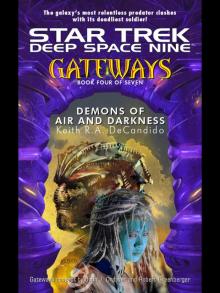 Demons of Air and Darkness
Demons of Air and Darkness Star Trek - TNG - 61 - Diplomatic Implausibility
Star Trek - TNG - 61 - Diplomatic Implausibility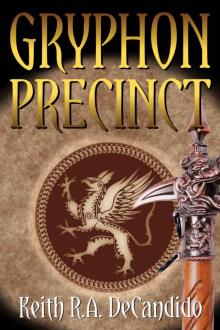 Gryphon Precinct (Dragon Precinct)
Gryphon Precinct (Dragon Precinct)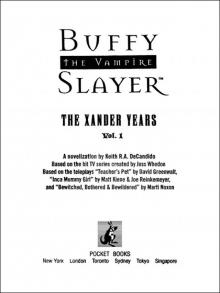 THE XANDER YEARS, Vol. 1
THE XANDER YEARS, Vol. 1 Nevermore
Nevermore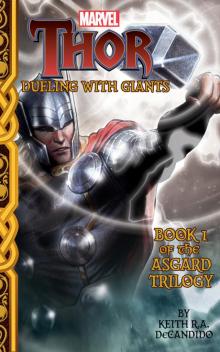 Thor
Thor The Brave And The Bold Book One
The Brave And The Bold Book One I.K.S. Gorkon Book Three
I.K.S. Gorkon Book Three STARGATE SG-1: Kali's Wrath (SG1-28)
STARGATE SG-1: Kali's Wrath (SG1-28) Bone Key
Bone Key Guilt in Innocece
Guilt in Innocece Star Trek - DS9 Relaunch 04 - Gateways - 4 of 7 - Demons Of Air And Darkness
Star Trek - DS9 Relaunch 04 - Gateways - 4 of 7 - Demons Of Air And Darkness The Art of the Impossible
The Art of the Impossible I.K.S. Gorkon Book One: A Good Day to Die
I.K.S. Gorkon Book One: A Good Day to Die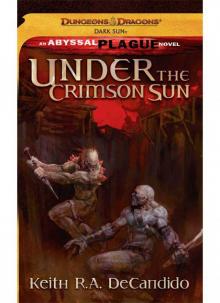 Under the Crimson Sun (the abyssal plague)
Under the Crimson Sun (the abyssal plague) DIPLOMATIC IMPLAUSIBILITY
DIPLOMATIC IMPLAUSIBILITY Tales from the Captain's Table
Tales from the Captain's Table A Burning House
A Burning House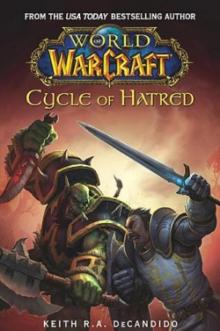 Cycle of Hatred (world of warcraft)
Cycle of Hatred (world of warcraft) Have Tech, Will Travel
Have Tech, Will Travel Security
Security